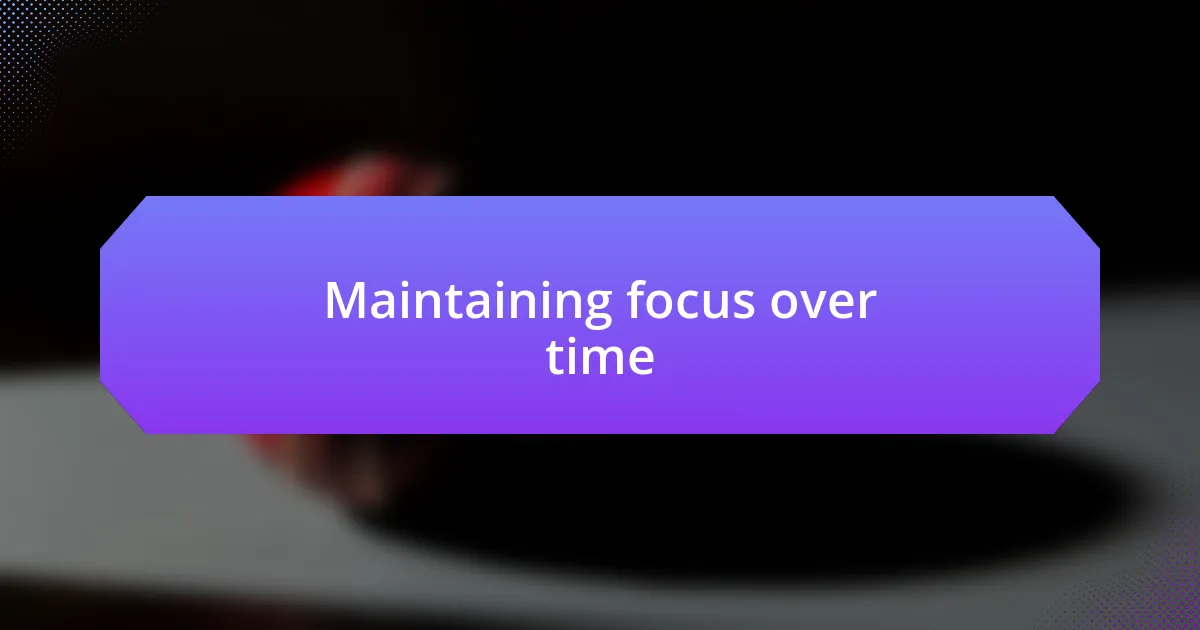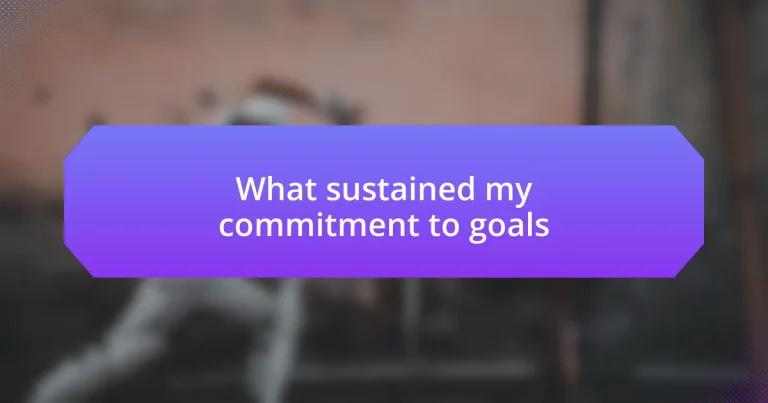Key takeaways:
- Commitment to goals is fueled by emotional connection and reflection, ensuring that it transcends mere checklist completion.
- Setting clear, realistic goals and breaking them into manageable milestones enhances motivation and fosters a sense of achievement.
- Tracking progress through journals, digital tools, and accountability partners can significantly bolster commitment and motivation.
- Obstacles should be viewed as growth opportunities, and maintaining a strong support network is essential for overcoming setbacks.

Understanding my commitment to goals
Understanding my commitment to goals often stems from a deeply personal place. I recall a time when I set a goal to run a marathon. The journey taught me that commitment isn’t just about discipline; it’s about passion and perseverance when the initial excitement fades. Have you ever felt that sense of exhilaration when you first set a goal? That thrill can quickly turn into a struggle if your heart isn’t fully aligned with your intention.
As I pushed through the long training runs, I had moments where doubt crept in, especially on days when my legs felt heavy and mentally I wanted to quit. In those challenging times, I learned to dig deep and find purpose—reminding myself why I started in the first place. This emotional connection is crucial; without it, goals risk becoming just another checkbox on a to-do list, don’t you think?
Reflection plays a significant role in sustaining my commitment. After each training session, I would ask myself what went well and what didn’t, allowing those insights to shape my next steps. This ongoing dialogue with myself created a solid foundation for my growth, reinforcing that my commitment wasn’t just about the finish line but rather the journey itself. How do you reflect on your own commitments?

Setting clear and realistic goals
Setting clear and realistic goals is a crucial step on the path to success. I vividly remember when I set a goal to learn a new language. Initially, I bit off more than I could chew by aiming to become fluent in just three months. I quickly realized that breaking down my goal into manageable milestones made a huge difference. As I celebrated small wins, like mastering basic phrases, it not only kept my motivation alive but also reminded me that progress is often incremental.
When setting goals, I’ve found it helpful to consider the following points:
- Define specific outcomes: Instead of “I want to get fit,” say “I will exercise for 30 minutes, five times a week.”
- Choose realistic timelines: Life can be unpredictable, so give yourself enough time to adapt and adjust your plan.
- Align with personal values: Ensure your goals resonate with what truly matters to you; this connection can fuel your commitment.
- Break it down: Divide larger goals into smaller, achievable tasks to stay focused and maintain momentum.
I believe that this approach not only makes the process less overwhelming but also fosters a sense of achievement with each completed task. It’s all about finding that balance that allows you to push your limits while setting yourself up for success.

Strategies for tracking progress
Tracking progress is essential for staying committed to your goals. One strategy I find particularly effective is maintaining a progress journal. When I started a fitness journey, jotting down my workouts and meals not only kept me accountable but also helped me reflect on my habits. Looking back at my entries, I could see patterns that motivated me to push harder or adjust my approach when I hit a plateau.
Another great method involves using digital tools. Mobile apps can provide daily reminders and visual representations of your progress. I remember using an app when I was preparing for a major exam; seeing a visual countdown to my test date really crystallized my daily study goals. The immediate feedback and gamified elements often spurred me to stay on track, reminding me that every small step counted towards my bigger objective.
Lastly, sharing your progress with someone can bolster accountability. I often set up weekly check-ins with friends who have similar goals. This not only creates a support system but also fosters a sense of healthy competition. I noticed that discussing our challenges and successes not only inspired me but deepened my commitment to my goals.
| Strategy | Description |
|---|---|
| Progress Journal | Document your journey to reflect and analyze patterns. |
| Digital Tools | Utilize apps for reminders and visual tracking of progress. |
| Accountability Partner | Share goals and progress with a friend for motivation. |

Overcoming obstacles and setbacks
When encountering obstacles, it’s important to reframe these moments as opportunities for growth. I vividly recall a time when I was training for a marathon and sprained my ankle a month before the race. Instead of feeling defeated, I shifted my focus to cross-training and injury recovery. This experience not only deepened my resilience but also equipped me with new strategies that benefited my overall fitness.
Setbacks can often feel demotivating, but I’ve learned that a small mindset shift can make a huge difference. For instance, when I didn’t achieve the grades I hoped for on an important assignment, I took a step back to analyze what went wrong. Reflecting on my methods revealed gaps in my understanding, guiding me to seek help and ultimately improving my performance. Have you ever faced similar moments? Sometimes, those tough experiences are the ones that prepare us for future success.
Lastly, building a strong support network can turn daunting obstacles into manageable challenges. During difficult times, I’ve relied on friends and mentors who uplifted me and shared their own stories of perseverance. Their encouragement reminded me that I wasn’t alone in my struggles. It’s comforting to know that reaching out can help transform setbacks into stepping stones, creating a path towards our goals.

Maintaining focus over time
Maintaining focus over time can feel like an uphill battle, especially when life throws distractions our way. I remember working on a long-term writing project and getting sidetracked by various commitments. One evening, I decided to set aside a dedicated hour each day just for my writing. It was a small change, but that consistency helped me to gradually see my goals materialize.
Staying focused isn’t just about time management; it’s about purpose. I often revisit my “why” behind my goals. For instance, when training for a professional certification, I kept my driving force in mind—the desire to expand my career possibilities. Reflecting on that motivation during challenging days reinvigorated my commitment.
Have you ever felt your excitement wane as time passed? I certainly have. I learned the importance of celebrating small milestones along the way, like finishing a chapter of my project or reaching a study target. These minor achievements serve as motivators, reminding me that each step is a vital part of my journey and keeps my focus sharp.














